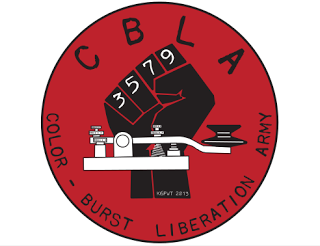https://www.merriam-webster.com/dictionary/kludge
What say our British cousins? How do you pronounce the word?
Kluge as in huge?
Kludge as in fudge?
Serving the worldwide community of radio-electronic homebrewers. Providing blog support to the SolderSmoke podcast: http://soldersmoke.com

| Solar X-rays: Geomagnetic Field: |

https://www.merriam-webster.com/dictionary/kludge
What say our British cousins? How do you pronounce the word?
Kluge as in huge?
Kludge as in fudge?
This book is especially important to the SolderSmoke community because its title has led to one of the most important concepts in our community and our lexicon: That we put "soul" in our new machines when we build them ourselves, when we make use of parts or circuits given to us by friends, or when we make use of parts (often older parts) in new applications. All of these things (and more) can be seen as adding "soul" to our new machines. With this in mind I pulled my copy of Tracy Kidder's book off my shelf and gave it a second read. Here are my notes:
-- On reading this book a second time, I found it kind of disappointing. This time, the protagonist Tom West does not seem like a great person nor a great leader. He seems to sit in his office, brood a lot, and be quite rude and cold to his subordinate engineers. Also, the book deals with a lot of the ordinary stupid minutia of organizational life: budgets, inter-office rivalry, office supplies, broken air conditioners. This all seemed interesting when I read this as a youngster. But having had bosses like West, and having lived through the boring minutia of organizational life, on re-reading the book I didn't find it interesting or uplifting.
-- The young engineers in the book seem to be easily manipulated by the company: They are cajoled into "signing up" for a dubious project, and to work long (unpaid) hours on a project that the company could cancel at any moment. They weren't promised stock options or raises; they were told that their reward might be the opportunity to do it all again. Oh joy. This may explain why West and Data General decided to hire new engineers straight our of college: only inexperienced youngsters would be foolish enough to do this. At one point someone finds the pay stub of a technician. The techs got paid overtime (the engineers did not), so the techs were making more money than the engineers (the company hid this fact from the engineers). The young engineer who quit probably made the right move.
-- The engineers use the word "kludge" a lot. Kidder picks up this term. (I'm guessing with the computer-land pronunciation that sounds like stooge.) They didn't want to build a kludge. There is one quote from West's office wall that I agree with: "Not everything worth doing is worth doing well." In other words, don't let the perfect be the enemy of the good. Sometimes a kludge will do.
-- Ham radio is mentioned. One of Wests lead subordinates was a ham as a kid. Kidder correctly connects this to the man having had a lonely childhood. Heathkit is also mentioned once, sarcastically.
-- The goal itself seems to be unworthy of all the effort: They are striving to build a 32 bit computer. But 32 bit machines were already on the market. The "New Machine" wasn't really new.
-- Kidder does an admirable job in describing the innards of the computer, but even as early as the 1978 models, I see these machines as being beyond human understanding. The book notes that there is only one engineer on the hardware team who has a grasp of all of the hardware. The software was probably even more inscrutable.
-- I found one thing that seemed to be a foreshadowing of the uBITX. The micro code team on this project maintained a log book of their instructions. They called it the UINSTR. The Micro Instruction Set. Kidder or the Microkids should have used a lower-case u.
-- The troubleshooting stories are interesting. But imagine the difficulties of putting the de-bugging effort in the hands of new college graduates with very little experience. I guess you can learn logic design in school, but troubleshooting and de-bugging seem to require real-world experience. We see this when they find a bug that turns out to be the result of a loose extender card -- a visiting VP jiggled the extender and the bug disappeared.
-- Kidder provides some insightful comments about engineers. For example: "Engineering is not necessarily a drab, drab world, but you do often sense that engineering teams aspire to a drab uniformity." I think we often see this in technical writing. Kidder also talks about the engineer's view of the world: He sees it as being very "binary," with only right or wrong answers to any technical question. He says that engineers seem to believe that any disagreement on technical issues can be resolved by simply finding the correct answer. Once that is found, the previously disagreeing engineers seem to think they should be able to proceed "with no enmity." Of course, in the real world things are not quite so binary.
-- This book won the Pulitzer prize, and there is no doubt about Kidder being a truly great writer, but in retrospect I don't think this is his best book. This may be due to weaknesses and shortcomings of the protagonist. I think that affects the whole book. In later books Kidder's protagonists are much better people, and the books are much better as a result: for example, Dr. Paul Farmer in Kidder's book Mountains Beyond Mountains.
-- Most of us read this book when we were younger. It is worth looking at again, just to see how much your attitudes change with time. It is important to remember that Tracy Kidder wrote this book when he was young -- I wonder how he would see the Data General project now.
-----------------------
Here is a book review from the New York Times in 1981:
https://archive.nytimes.com/www.nytimes.com/books/99/01/03/specials/kidder-soul.html?CachedAug
Here's one about a fellow who also re-read the book and who provides a lot of good links:
https://auxiliarymemory.com/2017/01/06/rereading-the-soul-of-a-new-machine-by-tracy-kidder/
Wow, this one really resonated with me. Jerry had me won over when, early in the interview, he described his decision to dispense with the Si5351/Arduino combo: "I said the hell with this digital stuff!" I hear you Jerry. I feel your pain OM.
Jerry then goes on to describe a rig with bits of circuitry from some legendary sources: The Ugly Weekender transmitter. SSDRA and EMRFD. W7ZOI's 1968 Direct Conversion receiver.
Jerry discusses the "presence" of the direct conversion receiver. And he decries the pernicious effects of AGC. (Indeed, real hams MANUALLY control the gain.)
The Wizard of Warrenton then shares some important tribal wisdom: After building that new piece of gear, leave it on the bench for a couple of weeks. Beware of "radio infatuation" (what a great term -- we will have to include this in the lexicon). Jerry points out that while at first, the new rig will seem just perfect, with time time the need for improvements and modifications will become apparent.
Jerry also has connections to India and Nepal (where he helped Father Moran). See: https://www.qrz.com/db/KI4IO
Here is W8SX's interview with Jerry:
http://soldersmoke.com/KI4IO23.mp3
Thanks Jerry! Thanks Bob!
At about 12:26 in this video, David Brooks uses the word "kludge" on the Public Broadcasting System. He pronounces it CORRECTLY! (But then he and the host question whether it is a real word.)
Putting "Basta" in the SolderSmoke search box yields many blog posts. The cry of ENOUGH! from six year-old Mafalda has been part of the podcast for many years and is now part of the SolderSmoke lexicon.
https://soldersmoke.blogspot.com/search?q=Basta
We don't do a lot of obits on this blog (we try to keep it all upbeat) but the passing of Mafalda's creator Quino is news that many of you may have missed, and that I think merits mention here. This link has a nice 3 minute report from NPR:
https://www.npr.org/2020/10/04/920038792/mafalda-cartoonist-quino-dies-at-88
Adios Quino. Gracias por todo.

